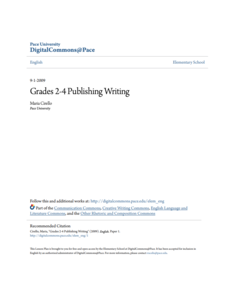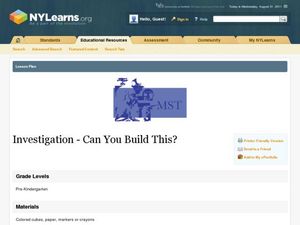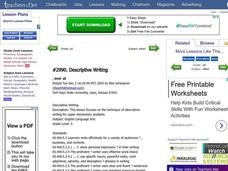Florida Center for Reading Research
Phonics: Encoding and Decoding, Letter Cube Blending
Emergent readers use a letter cube to identify, blend, and make words. They roll each of the three-letter cubes, mark down the letters they rolled, then blend the letter sounds together to make a word. They record each word on a...
Florida Center for Reading Research
Dictionary Cube
Young scholars investigate new vocabulary words with a fun, collaborative activity. Given a deck of word cards, pairs of students flip over one at a time and independently look up the term in a dictionary. They then take turns rolling a...
Brigham Young University
Out of the Dust: Cubing Strategy
Imagine using a six-sided cube to encourage readers to analyze a topic in greater depth. Create a cube, label each of the six sides with one of Bloom's comprehension levels, and you're ready to launch a discussion of a text....
Pace University
Publishing Writing
Scholars become familiar with tagline literature with the help of the story, Alexander and the Horrible, No Good, Very Bad, Terrible Day by Judith Viort. After a read-aloud and whole-class discussion, leveled groups complete...
Curated OER
Write the 3-D Shape's Name, Part 2
Geometry can be fun when you know the shapes! Twelve pictures of geometric shapes, including cones, pyramids, and spheres, prompt first graders to write the name of each shape in the space provided. Use the activity as a quiz or homework...
Florida Center for Reading Research
Vocabulary: Word Meaning, Dictionary Cube
Scholars work together to define words and answer questions using a dictionary cube.
Curriculum Corner
Bugs and Flowers Math and Literacy Centers
The sun shines, flowers bloom, and bugs fly—it must be Spring! Add a cheerful theme of bugs and flowers to math and literacy centers. Scholars take part in an assortment of activities designed to reinforce concepts such as...
Curated OER
Cube Coloring Problem
Upper elementary and middle schoolers describe the various features of unit cubes, such as edges, corners, and faces. They also discuss how to represent measurements of a cube using exponents before engaging in various thinking and...
Curated OER
My Antonia: Cubing Strategy
What is love? Why is it important? Explore this concept with an interactive activity that brings together Bloom's taxonomy and Willa Cather's My Antonia. After completing the novel, pupils toss a Bloom's cube and then answer the...
West Contra Costa Unified School District
Graph Square Root and Cube Root Functions
Scholars first learn to graph square root and cube root functions by creating a table of values. They then learn how to graph functions from transformation of the graphs of the parent square root and cube root functions.
Curated OER
Maus: Cubing Questioning Strategy
Maus is the text for a postreading activity that has class members using a cubing strategy to analyze, in depth, topics (racism, past and present, forgetting/remembering the Holocaust, representing the Holocaust) associated with Art...
Curated OER
Scientific Method Experiment: Factors Affecting How Ice Melts
Students demonstrate the scientific method by conducting an ice cube melting experiment. They make predictions and observations, and conclude what factors make ice melt more slowly or quickly than normal.
Virginia Department of Education
Translate and Evaluate
Translate, evaluate, educate. Discover how to translate and evaluate expressions. Young mathematicians first review words and phrases that indicate operations and learn to write algebraic expressions from verbal descriptions....
Beyond Benign
The Big Melt: Arctic Ice Caps
Are the Arctic ice caps really melting out of existence? Junior climatologists examine the statistics of ice decline through four math-based lessons. Each activity incorporates data, climate information, and environmental impact into an...
Curated OER
Brog-Cube-the Spam
A Middle school special ed class uses the acronym SPAM to learn the 4 parts of writing. They employ 4 different colors to help them visually distinguish each part of writing in a given prompt. This lesson is vague and uses a strong...
Curated OER
Ordinary People: Cubing Strategy
Readers of Ordinary People employ a cubing strategy based on Bloom’s Taxonomy to analyze, from multiple perspectives, an excerpt from Chapter 10 of Judith Guest’s novel. The excerpt, a rationale and complete directions for the...
American Battlefield Trust
Contrasting the North and South Before the War
Fundamental differences between the North and South led to the South adopting a system of enslaved labor. These abstract ideas become concrete when class members create a standing cube using information provided in the resource. Young...
Florida Center for Reading Research
Phonics: Onset and Rime, Word-Roll-A-Rama
Learners roll two die; die one contains various onsets, and die two contains different rimes. They write down the onset and rime pair they get, then blend and read their word.
Curated OER
Investigation--Can You Build This?
Early learners explore shapes using colored blocks. They first get some hands-on time with the blocks and then look at beginning math concepts regarding spatial relationships. They work with a partner to build a 6-8 block tower...
Curated OER
Recognizing 3D Shapes, Part 3
Do your first graders know the difference between cones and cylinders? Use this handy activity to help youngsters learn geometric shapes. With prisms, spheres, and pyramids, among others, this resource prompts pupils to identify each...
American Chemical Society
What is Density?
Density: the reason a giant pumpkin will float, but a tiny cranberry won't. Lesson begins with a demonstration of two of the same-sized cubes having different densities. Then pupils take eight cubes, each of the same size, and have to...
Columbus City Schools
To Measure its Mass or Volume?
Atoms, elements, and molecules, oh my! Teaching the fundamentals of chemistry to curious sixth graders has never been easier to accomplish. Here is a resource that pulls together everything needed to get them off to a good start,...
Curated OER
Descriptive Writing
Students discuss the importance of using adjectives in writing. They separate into five groups, each group is given a bag with an object inside to describe using just one sense. They write a description of a Hershey's Kiss using adjectives.
Pyro Innovations
Get into Shape
Shapes are so fun! Little ones explore, identify, and create shapes using tangrams or pattern blocks. The activity is intended to stimulate critical thinking while engaging learners through play and shape identification. Each child will...

























